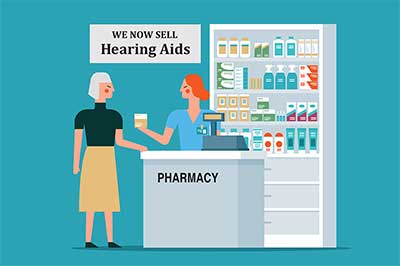Should You Buy an OTC Hearing Aid When They Become Available?
Last updated December 2020
 Hearing aids can benefit the vast majority of those who suffer such losses. But many patients can’t afford to buy them: Prices run between $2,000 and $8,000 per pair, and those costs aren’t covered by Medicare or most private insurance plans.
Hearing aids can benefit the vast majority of those who suffer such losses. But many patients can’t afford to buy them: Prices run between $2,000 and $8,000 per pair, and those costs aren’t covered by Medicare or most private insurance plans.
With the goal of making hearing healthcare more accessible and affordable, in 2017 a new law directed the Food and Drug Administration to create a new category of hearing aids that patients can buy on their own, without visiting a specialist.
Since then, the FDA has been working (slowly) to develop guidelines and quality standards for OTC hearing aids. As of this writing, the FDA still hadn’t issued its long-awaited proposed rules that will govern the sale of OTC aids, but in summer 2020 signaled it was nearly ready to do so. Once it does, the FDA likely will finalize its regulations about six months later, and OTC hearing aids can finally hit the market.
When available, OTC aids will be sold by drugstores, big-box retailers, internet sellers, and probably some hearing centers. Instead of visiting a specialist to get tested, choose and get fitted with one or two aids, and working with the provider to adjust the aids for your needs, you can buy an OTC aid and use its manufacturer’s website or app to conduct your own hearing evaluation and adjust the device yourself.
Since they’re not yet available, no one knows how inexpensive OTC aids will be. But specialists we spoke with estimate they’ll cost $100 to $750 each—and like models currently sold by pros, there likely will be considerable differences from device to device.
OTC hearing aids might also be a lower-risk purchase. Buy an expensive aid from a specialist, and if it doesn’t work well or you lose or damage it, you’re out perhaps thousands of dollars. If your dog eats an OTC model, well, you can just run down to the store and spend a few hundred dollars to buy another.
Another reason legislation was passed to approve OTC aids is that so many patients already DIY their hearing health: Crude devices are for sale online for as little as $10 each. But these unsophisticated gadgets usually just amplify all sound, and don’t offer much, if any, customization. The danger? Users will crank up the volume and accelerate their hearing loss. FDA-approved OTC aids, on the other hand, should offer more adjustment capabilities and better filters.
The FDA will approve OTC aids to treat only mild-to-moderate hearing loss (common signs: trouble understanding speech, especially when on the phone or in noisy environments, and sound from TVs seems muffled unless the volume is dialed up).
Because most OTC aids can’t be tailored to optimally improve an individual’s specific hearing loss, those with more severe hearing loss (difficulty understanding others when they speak even in quiet settings or have trouble hearing loud sounds, such as car horns) will have to consult a hearing specialist. These patients will benefit greatly from precise testing, buying advice, access to sophisticated listening devices, fitting, and adjustments.
Even those with mild or moderate loss may still do better buying from a specialist, rather than relying on OTC models. A big downside from OTC aids will be that many patients won’t get the help they really need. By cutting out a hearing pro from the process, you might not get accurate testing, help making the best device selection, continued monitoring, or optimized adjustments to your device, as needed. Hearing loss is usually a chronic condition that worsens over time; with this type of self-care, there’s a danger that some consumers will incorrectly set their aids’ volume too high, resulting in accelerated hearing loss.
Another downside: Because OTC aids won’t be molded to best fit your ear, they might not work as well as the customized models that specialists sell (molds can play critical roles in optimally delivering sound), and not be as comfortable to wear.
It’s also not clear whether you can easily return OTC hearing aids if you don’t like them. So ask about return periods and warranty coverage.
And, again: Before buying anything, first consult with a physician or audiologist to make sure your condition will benefit from a hearing aid.


